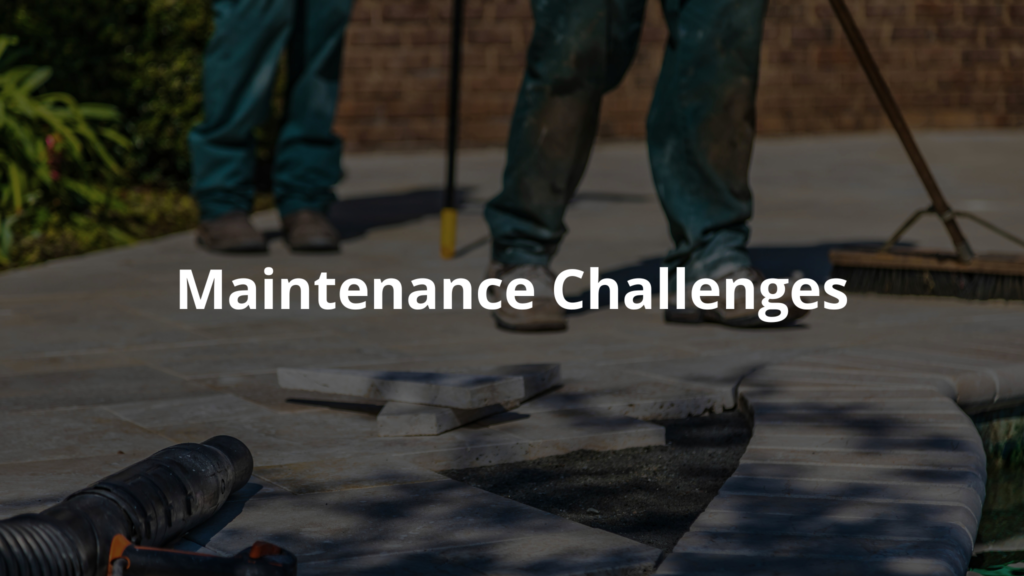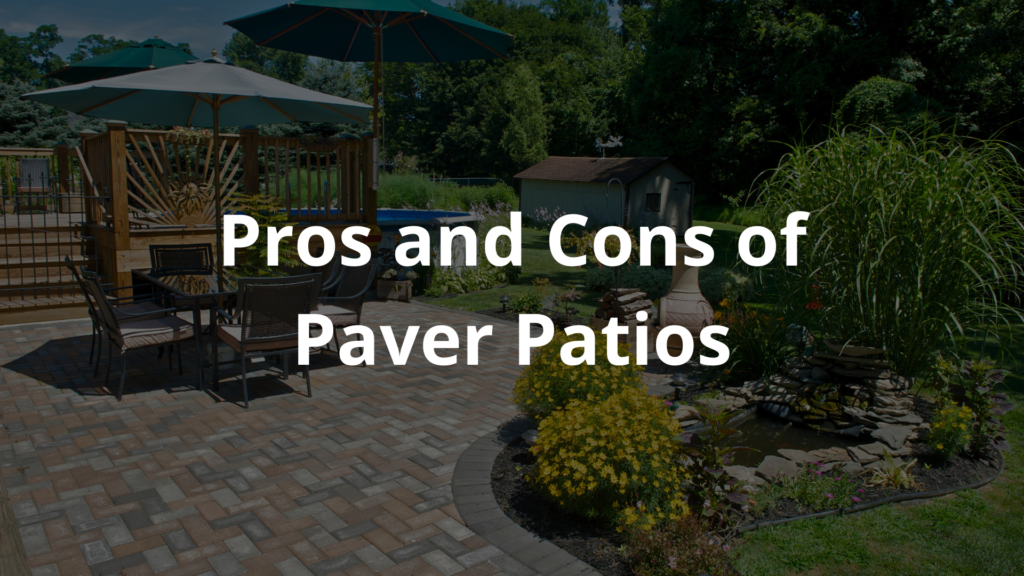This article explores the pros and cons of paver patios, helping you make an informed choice for your outdoor space in Charlotte.
Paver patios are like a beautiful puzzle in your backyard. Each piece fits together just right, creating a cozy space for family gatherings or simply relaxing under the sky. But, like any choice you make for your home, picking a paver patio has its good and not-so-good sides. If you live in Charlotte, North Carolina, and you’re thinking about adding one, it’s helpful to know what you might face. Stay with me as I unravel the pros and cons of paver patios(1).
Key Takeaways
- Paver patios are strong and can last for a long time.
- They come in many colors and shapes, so you can choose what looks best.
- But, they might cost more at first and need some care to keep them nice.
Pros of Paver Patios
Durability
Paver patios are incredibly strong and designed to last. Made from tough materials like clay bricks, natural stones, or solid concrete, they can handle the hustle and bustle of family gatherings and playful kids. Imagine hosting a barbeque where everyone enjoys the outdoor space without worrying about damage.
- Foot Traffic Ready: Built to withstand busy family activities.
- Weather-Resistant: Rain, snow, or summer heat won’t harm them.
- Flexible Design: Each paver can shift slightly, preventing cracks.
A well-installed paver patio can last over a decade. This durability is a big reason why so many homeowners in Charlotte opt for paver patios. They maintain their appearance, letting families enjoy their outdoor spaces year after year.
Aesthetic Appeal
Paver patios also bring a unique charm to any backyard. With a wide range of colours, shapes, and textures, homeowners can create a look that complements their style perfectly.
- Customizable Designs: Choose from earthy tones or vibrant colours.
- Versatile Layouts: Options like circular patterns or linear arrangements.
- Enhanced Value: A beautiful patio can increase your home’s worth.
With the right design, a paver patio becomes a personal oasis, making summer evenings in Charlotte even more delightful.
Ease of Repair
One of the standout features of paver patios is their simplicity when it comes to repairs. Accidents happen, whether it’s a heavy object dropped by a guest or a chip from regular use. Thankfully, replacing a damaged paver is a breeze.
- Quick Fix: Just pop out the broken piece and insert a new one.
- Cost-Effective: Avoid the expense of replacing the entire patio.
Imagine a lively gathering where a paver cracks during a game of cornhole. Instead of a costly overhaul, homeowners can simply replace that one paver, keeping the patio looking pristine for years.
Low Maintenance
Paver patios are also known for being low maintenance. Most homeowners want their outdoor spaces to look nice without spending all their time cleaning and fixing things. With paver patios, just a little bit of care is usually all it takes.
Regular cleaning with soap and water is often enough to keep them looking fresh. You might want to wash them down a few times a year to keep dirt and grime from building up. It’s a simple task that doesn’t take much time at all.
Some folks might need to seal the pavers every few years to help protect them. This helps them resist stains and keeps their colours vibrant. But even that’s not a huge chore! Compared to other patio types, these pavers require much less upkeep.
For instance, a homeowner in Charlotte could spend a Saturday afternoon cleaning their paver patio, and that’s it for the season. They can enjoy their patio without worrying about constant maintenance(2). It’s a practical choice for anyone who loves spending time outside but doesn’t want to spend all their weekends working on their space.
Increased Home Value
Last but not least, a well-designed paver patio can really boost a home’s value. When considering home improvements, it’s smart to think about what can offer the best return on investment. A beautiful outdoor space can be a major selling point.
In Charlotte, where outdoor living is important, having an inviting patio can make a home much more attractive to potential buyers. If someone is looking for a home, they might fall in love with a property that has a stunning paver patio.
This increased appeal can lead to a higher selling price if the homeowner ever decides to sell. It’s a win-win situation. By adding a paver patio, a family can enjoy their outdoor space for years, and when they’re ready to move on, they can see the benefits reflected in their home’s market value.
So, I think homeowners looking to improve their property should definitely consider paver patios. Not only do they provide a lovely outdoor experience, but they also add real value to the home.
Cons of Paver Patios
Higher Initial Cost
When it comes to money, paver patios can be a bit of a shock. The initial cost is usually higher than just pouring concrete. This is mainly because the materials are more expensive and the installation requires more time and effort. Depending on the type of paver selected, costs can range between $8 and $30 per square foot (that’s quite the spread!). When you think about how large your patio might be, it’s easy to see how the costs can add up quickly.
Imagine a family in Charlotte dreaming of a lovely outdoor space, only to realize the price tag might strain their budget. While paver patios are a beautiful investment, the upfront expense is something to consider. I think it’s wise to weigh the long-term benefits against the initial costs. Planning ahead is important.
- Material Costs: Expect to pay $8 to $30 per square foot.
- Installation Expenses: More time and effort lead to higher labour costs.
- Budgeting: Think about the total cost over the patio’s lifetime.
Maintenance Challenges

Even though paver patios are generally low-maintenance, they still come with their own set of challenges. Weeds can sneak into the gaps between the pavers if left unattended. This can be frustrating for homeowners who want their outdoor space to look inviting.
To keep a paver patio looking fresh, regular maintenance is needed. This means pulling those pesky weeds or adding more sand to fill the gaps when necessary. It’s a little extra work that can catch some homeowners off guard. For instance, a family might find themselves spending a Saturday morning cleaning out the weeds, wishing they had thought ahead.
- Weed Growth: Keep an eye on gaps to prevent weeds.
- Maintenance Tasks: Regularly fill gaps with sand and clean.
- Time Commitment: Plan for occasional upkeep to maintain appearance.
Potential for Uneven Settling
Another consideration is the potential for uneven settling over time. If the ground shifts or if the pavers weren’t installed correctly, areas of the patio may become uneven. This can be a real headache if you’re aiming for a smooth surface.
Homeowners might find themselves adjusting or resetting some pavers, which can take time and effort. Picture a family trying to enjoy a game of outdoor cornhole, only to realize they’re standing on an uneven surface. This unevenness could lead to tripping hazards or just an unappealing look.
- Ground Movement: Changes in the earth can affect stability.
- Installation Matters: Proper installation is key to preventing issues.
- Regular Checks: Inspect for settling and adjust as necessary.
Installation Complexity
Finally, installing a paver patio is a more complicated process than just pouring concrete. It requires careful planning to ensure the base is solid and that water can drain properly. This complexity can lead to higher labour costs, which might surprise some homeowners considering a paver patio.
A professional installation might seem like an extra cost, but it can prevent headaches later. Poor installation can lead to all sorts of issues down the line, from uneven surfaces to drainage problems. So, I think it’s crucial for homeowners to consider these aspects before jumping in.
- Planning Required: Proper base and drainage are essential.
- Labour Costs: Higher complexity often leads to increased costs.
- Professional Help: Consider hiring experts to avoid future issues.
Conclusion
So, when you think about paver patios, there’s a lot to consider. They’re durable, pretty, easy to fix, and don’t need much care. But they can cost more upfront, have some maintenance challenges, and need careful installation.
If you’re a homeowner in Charlotte, weigh these pros and cons to help you make the best choice for your outdoor living space. For a hassle-free installation and expert craftsmanship, contact Lapis Patios and bring your vision to life.
FAQ
How do pavers compare to poured concrete for outdoor living spaces?
Pavers offer more design options and aesthetic appeal compared to poured concrete. While concrete slabs provide a smooth surface, paver patios excel in variety of colors and shapes and sizes. Concrete can crack over time, while individual pavers are easily replaced if damaged. However, paver patio installation is more labor intensive and has a higher initial cost.
What makes paver patios a popular choice for weather conditions in Charlotte NC?
Paver patios are highly durable and withstand heavy foot traffic in Charlotte’s varying weather elements. The interlocking design helps prevent an uneven surface common with concrete patios. Natural stone pavers and concrete pavers both handle weather conditions well, though proper installation is crucial for longevity.
What maintenance is required for paver patios versus concrete?
Low maintenance is a key advantage of paver patios. Basic cleaning and sealing with soap and water keeps them looking fresh. Weed control between small pieces requires minimal upkeep, though weed growth can occur if not properly installed. Concrete patios may need less frequent maintenance but are harder to repair when damaged.
What are the functional benefits of choosing paver patios?
Pavers are durable and can handle heavy wear and tear in outdoor living space. The patio surface remains stable through the entire process of settling, unlike concrete slabs. Paver driveways and retaining walls can be integrated seamlessly. For landscape design purposes, pavers work well with landscape lighting and create functional outdoor spaces.
What installation considerations should inform my decision?
The paver patio installation process is longer installation than concrete installation. While labor intensive, properly installed pavers create a more stable patio surface. The mixture of cement used in stamped concrete patio may be simpler to install, but lacks the individual units flexibility of pavers. Consider time and budget when making an informed decision.
References
- https://earthscapesgardenroom.com/a-comprehensive-guide-to-paver-patios-pros-cons-and-maintenance-tips
- https://www.deck.plus/blog/low-maintenance-paver-patio/

